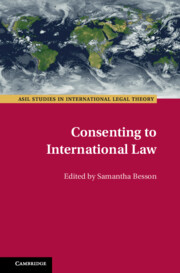41 results
Part II - Objects and Types of Consent
-
- Book:
- Consenting to International Law
- Published online:
- 23 November 2023
- Print publication:
- 07 December 2023, pp 135-248
-
- Chapter
- Export citation
Preface
-
- Book:
- Consenting to International Law
- Published online:
- 23 November 2023
- Print publication:
- 07 December 2023, pp xi-xii
-
- Chapter
- Export citation
Index
-
- Book:
- Consenting to International Law
- Published online:
- 23 November 2023
- Print publication:
- 07 December 2023, pp 369-380
-
- Chapter
- Export citation
Copyright page
-
- Book:
- Consenting to International Law
- Published online:
- 23 November 2023
- Print publication:
- 07 December 2023, pp vi-vi
-
- Chapter
- Export citation
Contents
-
- Book:
- Consenting to International Law
- Published online:
- 23 November 2023
- Print publication:
- 07 December 2023, pp vii-viii
-
- Chapter
- Export citation
Consenting to International Law
-
-
- Book:
- Consenting to International Law
- Published online:
- 23 November 2023
- Print publication:
- 07 December 2023, pp 1-28
-
- Chapter
- Export citation
Part I - Notions and Roles of Consent
-
- Book:
- Consenting to International Law
- Published online:
- 23 November 2023
- Print publication:
- 07 December 2023, pp 29-134
-
- Chapter
- Export citation
Contributors
-
- Book:
- Consenting to International Law
- Published online:
- 23 November 2023
- Print publication:
- 07 December 2023, pp ix-x
-
- Chapter
- Export citation
Part III - Subjects and Institutions of Consent
-
- Book:
- Consenting to International Law
- Published online:
- 23 November 2023
- Print publication:
- 07 December 2023, pp 249-368
-
- Chapter
- Export citation
14 - From Equal State Consent to Equal Public Participation in International Organizations
- from Part III - Subjects and Institutions of Consent
-
-
- Book:
- Consenting to International Law
- Published online:
- 23 November 2023
- Print publication:
- 07 December 2023, pp 314-346
-
- Chapter
- Export citation

Consenting to International Law
-
- Published online:
- 23 November 2023
- Print publication:
- 07 December 2023
Contributors
-
- Book:
- Theories of International Responsibility Law
- Published online:
- 01 September 2022
- Print publication:
- 08 September 2022, pp xi-xii
-
- Chapter
- Export citation
Theorizing International Responsibility Law, an Introduction
-
-
- Book:
- Theories of International Responsibility Law
- Published online:
- 01 September 2022
- Print publication:
- 08 September 2022, pp 1-24
-
- Chapter
- Export citation
Index
-
- Book:
- Theories of International Responsibility Law
- Published online:
- 01 September 2022
- Print publication:
- 08 September 2022, pp 349-356
-
- Chapter
- Export citation
Copyright page
-
- Book:
- Theories of International Responsibility Law
- Published online:
- 01 September 2022
- Print publication:
- 08 September 2022, pp vi-vi
-
- Chapter
- Export citation
Part IV - Responsibility of Public Institutions: A World Tour
-
- Book:
- Theories of International Responsibility Law
- Published online:
- 01 September 2022
- Print publication:
- 08 September 2022, pp 277-348
-
- Chapter
- Export citation
Part I - International Responsibility of Public Institutions: Public and/or Private?
-
- Book:
- Theories of International Responsibility Law
- Published online:
- 01 September 2022
- Print publication:
- 08 September 2022, pp 25-116
-
- Chapter
- Export citation
Contents
-
- Book:
- Theories of International Responsibility Law
- Published online:
- 01 September 2022
- Print publication:
- 08 September 2022, pp vii-x
-
- Chapter
- Export citation
Part III - International Responsibility of Public Institutions: Fault-based or Not?
-
- Book:
- Theories of International Responsibility Law
- Published online:
- 01 September 2022
- Print publication:
- 08 September 2022, pp 207-276
-
- Chapter
- Export citation
Preface
-
- Book:
- Theories of International Responsibility Law
- Published online:
- 01 September 2022
- Print publication:
- 08 September 2022, pp xiii-xiv
-
- Chapter
- Export citation



